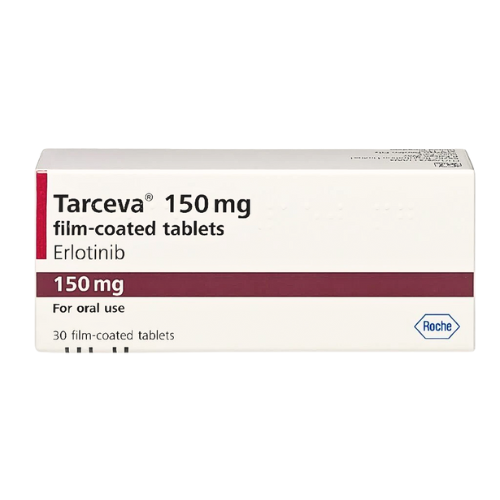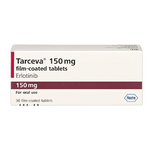Tarceva (Erlotinib)
Reliable shipping
Flexible returns


Tarceva (Erlotinib) is a targeted therapy used primarily for the treatment of non-small cell lung cancer (NSCLC) and pancreatic cancer. It functions as an epidermal growth factor receptor (EGFR) inhibitor, blocking the signals that promote tumor growth and proliferation.
Here are some key highlights of Tarceva:
- Mechanism of Action: Tarceva specifically inhibits the tyrosine kinase activity of the EGFR, which is often overexpressed in various cancers, leading to reduced tumor growth.
- Indications: It is approved for patients with locally advanced or metastatic NSCLC who have not responded to other treatments. Additionally, it is indicated for use in patients with pancreatic cancer in combination with gemcitabine.
- Administration: Tarceva is administered orally, allowing for convenient daily dosing. It can be taken with or without food, but consistency in how it is taken is important for optimal absorption.
- Side Effects: Common side effects include rash, diarrhea, and fatigue. Patients may also experience more serious effects, such as lung problems or liver toxicity, and should be monitored closely.
- Patient Selection: Testing for EGFR mutations is recommended before starting treatment, as Tarceva is most effective in patients with specific genetic alterations.
- Clinical Studies: Clinical trials have demonstrated improved survival rates in patients with specific types of NSCLC when treated with Tarceva compared to those receiving standard chemotherapy.
- Supportive Care: Patients on Tarceva may benefit from supportive care measures to manage side effects, including dermatologic care for skin rash and hydration for diarrhea.
Overall, Tarceva represents a significant advancement in the targeted treatment of certain cancers, providing options for patients who may not respond to conventional therapies.
- Erlotinib
- Microcrystalline cellulose
- Hydroxypropyl cellulose
- Colloidal silicon dioxide
- Magnesium stearate
- Film coating (hypromellose, titanium dioxide, polyethylene glycol)
Tarceva (Erlotinib) is a medication used primarily for the treatment of non-small cell lung cancer and pancreatic cancer. It is important to follow your healthcare provider's instructions carefully when using this medication to ensure its effectiveness and minimize the risk of side effects.
Before starting Tarceva, inform your doctor about any other medications you are taking, as well as any allergies or medical conditions you may have. This will help your doctor determine if Tarceva is the right choice for you.
Tarceva is typically taken orally, with or without food. It is usually prescribed as a once-daily dose. It is essential to take the medication at the same time each day to maintain an even level of the drug in your system.
- Take Tarceva exactly as prescribed by your healthcare provider. Do not take more or less than the recommended dose.
- Swallow the tablet whole with a glass of water. Do not crush, chew, or break the tablet, as this can affect how the medication is absorbed by your body.
- If you miss a dose, take it as soon as you remember. However, if it is almost time for your next dose, skip the missed dose and continue with your regular schedule. Do not double up on doses.
- Stay hydrated while taking Tarceva. Drink plenty of fluids to help prevent dehydration, especially if you experience side effects such as diarrhea.
- Regularly monitor your health with your healthcare provider. This may include blood tests or imaging studies to assess your response to treatment and monitor for potential side effects.
Common side effects of Tarceva include rash, diarrhea, and nausea. If you experience severe side effects or signs of an allergic reaction, such as difficulty breathing or swelling, seek medical attention immediately.
It is crucial to avoid certain medications and supplements that may interact with Tarceva. Always consult your healthcare provider before starting any new medications or over-the-counter products while on this treatment.
Finally, do not stop taking Tarceva without consulting your healthcare provider, as this may affect your treatment outcomes. Always follow up with your healthcare team for ongoing support and guidance throughout your treatment journey.